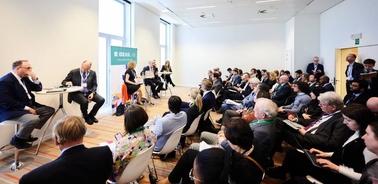Rethinking Global Alliances: How Can the EU Creatively Engage with Emerging Middle Powers?

In an era of shifting global dynamics, the European Union faces an urgent need to redefine its international partnerships. At the CEPS Ideas Lab 2025, the Global Policy Center (GPC) co-organized a timely panel titled “How Can the EU Creatively Engage with Emerging Middle Powers?”.
The session gathered politicians and scholars to explore how the EU can strategically position itself in a multipolar world where traditional alliances are being reshaped. The panel featured Enrico Letta, Dean of the IE School of Politics, Economics, and Global Affairs and President of the Jacques Delors Institute; Cecilia Malmström, non-resident Senior Fellow at the Peterson Institute for International Economics and former European Commissioner for Trade; John Zysman, Professor Emeritus at the University of California, Berkeley and Co-founder of the Berkeley Roundtable on the International Economy (BRIE); David Ringrose, Head of Division for Connectivity & Digital Transition at the European External Action Service (EEAS), European Commission; and Rym Ayadi, Senior Advisor at CEPS and President of the Euro-Mediterranean Economists Association (EMEA). The debate was moderated by Ilke Toygür, Director at the GPC and Professor of Practice at IE University.
The discussion took place against the backdrop of a dying transatlantic relationship, as the U.S. undergoes a visible retreat from its global commitments. Vice President J.D. Vance’s recent Munich speech—which conveyed an ideological shift in Washington—was a clear indication that Europe can no longer rely solely on the U.S. as its primary strategic ally. Instead, the EU must forge new partnerships with emerging middle powers in Latin America, Africa, and Asia to maintain its global relevance, economic competitiveness, and geopolitical stability.
Reinventing the EU’s Global Role: Beyond Transatlantic Dependency
One of the central themes of the panel was how the EU can capitalize on this moment of global realignment to strengthen its engagement with emerging middle powers. As the U.S. retreats from multilateralism, John Zysman underscored the opportunities this shift presents for the EU. Yet, he emphasized the need for Europe to reassess its economic and regulatory strategies to sustain its leadership in global trade and governance.
Enrico Letta and Cecilia Malmström examined how the EU Single Market and trade agreements can serve as key tools for expanding European influence. Malmström pointed out that "no country has more trade agreements than the EU”, positioning it as a leading force in intercontinental integration. From the EU-Japan and EU-Singapore agreements to potential membership in CPTPP, the EU has a unique capacity to shape global economic rules.
Leveraging Connectivity, Finance, and Regulation
The conversation also explored the EU’s Global Gateway initiative, with David Ringrose emphasizing its potential through sustainable infrastructure investment and digital partnerships. He underscored how the Brussels Effect—the EU’s ability to set regulatory standards globally—gives it a competitive edge in shaping global markets.
Rym Ayadi brought in the financial perspective, advocating for more innovative financing mechanisms such as blended financing and hybrid public-private partnerships to drive cooperation with middle powers. She cited the India-Middle East-Europe Economic Corridor (IMEC) as a successful model of region-to-region collaboration that could be replicated elsewhere.
Navigating the Geopolitical Crossroads
The panelists agreed that EU engagement must be both strategic and bold, balancing economic security with geopolitical influence. They discussed the need to address key sectors such as energy, digital infrastructure, and financial markets, ensuring that the EU remains globally competitive while upholding its values.
Furthermore, as the EU deepens cooperation with Latin America, ASEAN, and Africa, there is an increasing focus on co-regulation and risk-sharing mechanisms. The conversation also touched upon whether the EU will follow the U.S. retreat or take a more assertive global role—particularly in areas like monetary policy, defense integration, and UN engagement.
A Call for Creative Diplomacy and Strategic Action
With 200 countries shaping today’s global landscape, the EU must diversify its partnerships and adapt to a new multipolar reality. From region-to-region digital dialogues to critical minerals agreements, the EU has the tools to build a more resilient and interconnected global strategy. As one panelist noted, "The question is not whether the EU can engage with emerging middle powers, but how boldly it is willing to do so."
The CEPS-GPC panel underscored that the time for action is now—the EU must seize this moment to redefine its global role, build new alliances, and secure its place as a leader in the 21st-century world order.